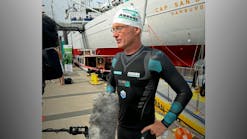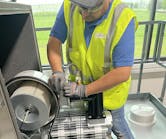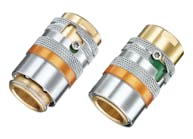Part 2 of a series on injection molding machinery that tackles recycled materials and new resins.
Engel said it has made huge investments during the last few years in the circular economy, including developing plasticizing technology to process recycled resins.
“We increased the size of our team,” said Günther Klammer, VP of plasticizing systems and recycling. “We built a new facility for the production of screws and barrels with new furnaces for the heat treatment of machining parts. We installed laser technology for welding. We increased the laboratory equipment, for example, with the electronic microscope to analyze and to get a deep understanding of the plasticizing of the raw materials and the recycling materials. The circular economy became very integrated and a very important part of our corporate technology. It became part of our DNA.”
Related: Wilmington's specialty machinery adds value to recycled materials
Klammer said that requirements placed on plasticizing units continue to grow with the use of recycled materials, and the company will modify its units to specific requirements as needed.
Fluctuations in material properties pose a significant challenge for processing recycled resins. Even homogeneously collected and treated plastic waste is subject to greater fluctuations than virgin resin because the recyclate’s properties are influenced by how contaminated the waste is and the process used to wash, shred and repelletize it. Also, recycled materials are generally sourced from different suppliers. Recycling companies often use different technologies, so the variance is likely to be high when a batch of recycled material is changed.
“We ensure that new materials can be processed even faster and to even higher quality standards despite what are in part increasing stresses on mechanical components,” Klammer said.
When plastic melt is injected into a mold, it is influenced by many factors. In addition to fluctuations in raw materials, other factors include changing ambient temperatures and humidity, and fluctuations in the closing of the non-return valve, he said.
“We have a solution in our Inject 4.0 program, which is an intelligent assistance system,” Klammer said. “It is the Engel iQ series or iQ product range. For example, the iQ weight control keeps a constant product by measuring the viscosity of the material and then the system modifies all the parameters to have the same product quality and the same part weight. This is done automatically and it helps handle the difference in the input material.”
The company introduced iQ weight control, which has been on the market since 2012 using virgin material, to improve process repeatability when using recycled materials at K 2019. IQ weight control can recognize minor deviations in the viscosity from a reference value. The software detects fluctuations in raw materials and in the ambient conditions, and adjusts the injection profile, switchover point and holding pressure individually for each shot to suit the current production conditions. By doing this, the assistance system keeps the filling volume constant even with fluctuating viscosity, which prevents the incomplete filling of parts, he said. More consistent filling also helps ensure that the same compression will be used.
“Secondly, we also launched a product called iQ melt control, which is part of the complete solution of the self-automizing injection molding machine,” Klammer said. “This helps and gives advice to the user about how to adjust and modify the machine to get proper results.”
The iQ melt control software helps processors handle recycled material that has different melt indices, he said.
Engel’s skinmelt process also has applications for users of recycled materials. It allows processors to use more recycled material, even for parts with complex geometries or demanding surface-quality requirements. The company refers to this as sandwich injection molding, because recycled material is placed in the interior of the part while virgin material is reserved for the exterior to create a high-quality surface.
When it introduced the technology at K 2019, Engel used the skinmelt process to produce transport crates made with more than 50 percent recycled resin. Both recycled and virgin material were PP, so the crates can be recycled at the end of their useful life. The percentage of recycled material that can be used is determined by the part geometry and the cavity filling pattern.
“There are two injection units for the skinmelt process,” Klammer said. The second unit for the skin material is mounted at a shallow angle above the horizontal injection unit. The process is controlled by software.
“There were several adjustments due to this second injection unit, which has to be movable,” he said. “Most modifications were done in the control unit of the plasticizing unit. The recycling material normally needs a high wear-resistance on the system. Due to the part density on the core component, it also needs a wider opening on the barrel. We made several modifications in order to maintain the lower part density, the variations of the part density, and we also increased the wear-resistance of the screw and the barrel to handle the recycled material.”
Engel’s CC300 injection molding machine control unit displays data about the skinmelt process, which allows the operator to adjust the mixing ratio of the recycled and virgin materials.
“The new software justifies the skin and the core in a proper ratio,” Klammer said. “We designed a slider on the screen so you can move the slider to change the ratio between the skin and the core component. This makes the machine very easy to handle. Before this, it was very difficult to find the proper parameters on both injection units and have the proper ratio and the proper loading.”
Several of these modifications – such as making the plasticizing unit more wear-resistant, and modifications to the screw and the non-return valve – were driven by the skinmelt process, but they also are helpful when working with other recycled materials, he said.
Bruce Adams, senior staff reporter
Contact:
Engel Machinery Inc., York, Pa., 717-764-6818, www.engelglobal.com






